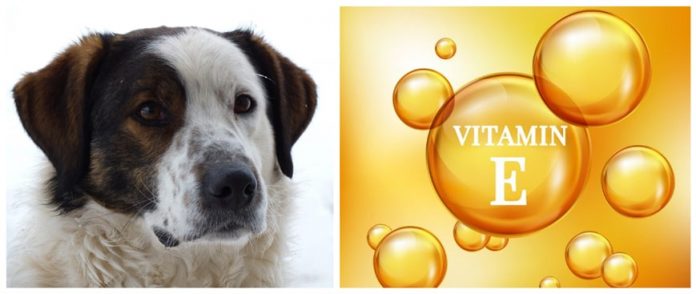
Vitamin E is a chemical compound that serves as an antioxidant inside the body. It works by neutralizing free radicals, the highly reactive molecules that take away electrons from our cells, preventing them to cause further harm inside the body.
Aside from being an antioxidant, it also helps in the formation of red blood cells. It is often used as an ingredient in skin care products because it can treat a number of skin problems, such as rashes, dryness, and itching.
Vitamin E has a myriad of benefits for us. But what about for our pets? Do they also need their daily dose of Vitamin E? If yes, then what are the ways to give them this nutrient? Is it through feeding them foods rich in Vitamin E or do they need a supplement? Read more about the importance of this vitamin to dogs.
Do Canines Need Vitamin E Supplements?
Your pet needs Vitamin E but not necessarily in the form of supplements. The best way to give it to a dog is by including a Vitamin E-rich food in his diet. There are a lot of foods rich in this vitamin and most of them can be safely shared with our pets.
The only time it is necessary to supplement a dog with vitamin E is if he is not getting enough of it from his diet. Many dogs on a raw food diet are recommended to have Vitamin E supplements because they might be getting low levels of it from food. Canines on fish oil supplements should also take Vitamin E because they are exposed to dietary fats that can contribute to Vitamin E deficiency.
Your vet may also recommend Vitamin E supplement if your pet is suffering from Canine Atopic Dermatitis. Studies suggest that dogs with CAD have low levels of skin vitamin E concentrations. If your dog has CAD, ask your vet about the proper usage of this supplement. It may also help dogs with renal failure because it can serve as a protective antioxidant in progressive renal failure in dogs.
Are Vitamin E Supplements for Humans Safe for Dogs?
Yes, in fact, many pet owners are giving human Vitamin E to their pets. There’s nothing wrong with this but consider the fact that there are existing supplements created specifically for dogs. There is also commercially produced dry dog food enriched with Vitamin E.
It’s still important to get your vet’s consent before giving any supplement to your pet because Vitamin E can also have risks if ingested in too high amounts. It belongs to the group of fat-soluble vitamins, which means it is stored throughout all body tissues but mostly in the liver and has the tendency to remain in the body for much longer than other nutrients. It is not easily removed through urine.
Because it is not easily expelled from the dog’s system, it may cause an overdose if taken in large quantities. The excess fat-soluble vitamins can accumulate inside the body over time and can interfere with the normal blood clotting and could even put a dog’s life at risk.
How Much Vitamin E is Safe for Dogs?
The recommended Vitamin E dosage for dogs is 13.6 IU per pound of body weight, although it can increase depending on the pet’s current diet and health condition. Small to medium-sized canines can be safely given 400 IU of Vitamin E per day, while a large dog can be given an 800 IU per day.
Your pet’s requirements will increase if his diet is high in polyunsaturated fats. If he is on a raw-food diet and often consumes animal organs and fish, he can greatly benefit from the added Vitamin E.
What Are The Benefits of Vitamin E to Canines?
Vitamin E is best known for its skin benefits. For dogs, it’s also essential for a healthy coat. It makes our furry little friends less susceptible to a plethora of skin diseases, including hot spots, rashes, and flea allergy dermatitis. But this vitamin can do more for your pet’s overall wellness. Here are a few more reasons why it’s a good addition to any dog’s diet:
- It can strengthen the dog’s immunity. The antioxidant activity of Vitamin E is powerful enough to support your pet’s immune system. It makes sure Fido’s healthy cells are protected from the free radicals that can threaten his immunity.
- It prevents the loss of mass in muscles. When the muscle mass is reduced, it also has the tendency to become weak. If you own a working dog breed, such as a Bullmastiff, Canaan Dog, and Black Russian Terrier, you have to exert more effort in making sure he has strong and healthy muscles.
- It can protect your dog’s paws from the cold weather. As with humans, canines could also suffer from skin dryness when it’s too cold. You may dab a bit of Vitamin E oil on your dog’s paws to moisturize them. If you’re worried he might lick it, just wrap gauze around.
- It can be used to treat warts. If your pet has warts, you may use the contents of a Vitamin E capsule to treat the affected area. You may also apply coconut oil for canine warts because it is an excellent source of Vitamin E.
- It is a natural remedy for ear infections. You can put a few drops of Vitamin E oil in your pet’s ear because it has a soothing effect and can relieve the discomfort associated with the infections.
- It can improve your our pet’s fertility. Studies have shown that Vitamin E-deficient canines are more vulnerable to reproductive problems including infertility. This is because Vitamin E is capable of delaying your pet’s aging process.
- It can alleviate symptoms of canine allergies. In dogs, allergies are often associated with skin itching. You can use a Vitamin E supplement directly on your pet’s skin to make him feel at ease.
How to Give Vitamin E to Dogs
Vitamin E can be given orally or applied right on the affected area of the skin. As a supplement, it is sold in the form of tablets or capsules. Do note that supplements may contain a few other ingredients apart from Vitamin E such as acetate and soya oil. If your pet reacts to certain ingredients, it pays to check the list of ingredients carefully.
Make sure to check with your veterinarian before giving any supplement to your pet, or before applying anything on his skin. If he’s suffering from allergies, your vet will also need to recommend a hypoallergenic diet.
Natural Sources of Vitamin E for Dogs
If your pet is raw-fed, here are some of the best types of food you can offer to him:
- Sunflower seeds – a handful of sunflower seeds provides 7.4 milligrams of vitamin E. It’s one of the safe treats for dogs that you can offer once in a while. Just make sure to remove the shells and only give him small amounts.
- Spinach – when cooked, a cup of spinach can give your dog around 3.7 milligrams of vitamin E. Other leafy greens such as Swiss chard, beet greens, and turnip greens also contain this vitamin. Contrary to myths, this vegetable is safe for doggies. Steam it and chop in small pieces before serving it to your dog.
- Butternut squash – a cup of cooked butternut squash has 2.6 milligrams of vitamin E. All types of squash are good for dogs but most of them enjoy eating butternut squash due to its sweetness. You can use it as an ingredient for your pet’s homemade meal. Make sure it is cooked well and does not contain spices and seasonings.
- Olive oil – plant oils, especially olive oil contain high amounts of vitamin E. A tablespoon already provides 1.9 milligrams. It can be added to the dog’s dry or wet food. The recommended amount is a teaspoon per day for small to medium-sized dogs. Larger dogs can have as much as a tablespoon per day.
- Wheat germ – you can give it in the form of oil because it contains a high concentration of Vitamin E. A capsule of non-GMO wheat germ oil contains as much as 164 milligrams of Vitamin E. You can add a few drops of it on your dog’s meal each day.
The Bottom Line
Vitamin E is an essential vitamin for dogs because of its antioxidant properties and several internal benefits. You can give him Vitamin E-rich food if he’s not getting enough of it in his diet and he could also benefit from supplements especially if he is suffering from itching and skin allergies.





















